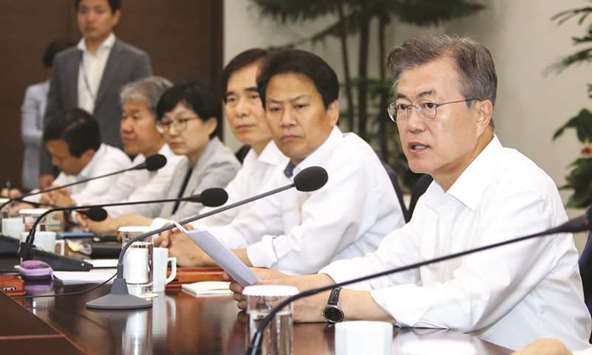Moon and Kim Jong-un held a surprise meeting on Saturday at the border village of Panmunjom, during which they agreed that a North Korea-US summit must be held. “What’s more important than anything from the latest inter-Korean summit was that the leaders easily got in contact, easily made an appointment and easily met to discuss urgent matters, without complicated procedures and formalities, just like a casual meeting,” Moon told a meeting with senior secretaries.
Trump last week pulled out of the meeting with Kim, planned for June 12 in Singapore, before announcing he had reconsidered and American and North Korean officials were meeting to work out details.
On Sunday, the US State Department said US and North Korean officials had met at Panmunjom, a village in the demilitarised zone (DMZ) that runs along the heavily armed border between North and South Korea. A “pre-advance” team of US officials was also travelling to Singapore to meet with North Koreans there, the White House said.
Asian stocks and US share futures gained yesterday, while shares in South Korean construction and railway firms surged after Trump said his officials and North Korea have resumed talks to prepare for the summit in June.
Shares of Shinwon Corp, which used to operate factories in the Kaesong industrial region near the demilitarised zone, jumped 22%, while Hyundai Engineering & Construction gained 24 percent.
A US official told Reuters that Sung Kim, the former US ambassador to South Korea, was leading the American delegation to meet North Korean officials at the border.
“It’s a good thing to have him onboard,” said a former senior South Korean official who worked with Sung Kim in past. “He’s capable, level-headed, cautious, and has solid grasp of the issues and knows North Koreans well. But at the same time he has healthy scepticism.”
Pentagon official Randall Schriver was also part of the US team, the US official said. The Washington Post first reported the team met with Choe Son Hui, the North Korean vice foreign minister. The US delegation also included Allison Hooker, the Korea expert on the White House National Security Council. After weeks of political posturing by both Trump and Kim, analysts welcomed the news the United States had dispatched a team of seasoned negotiators to hold several days of preparatory talks with the North Koreans.
“Sending such an experienced and professional team signals that the Trump administration is getting serious about the specifics of an agreement,” said former US deputy assistant secretary of defence for East Asia, Abraham Denmark. “It’s also an implicit acknowledgement that running this negotiation out of the Oval Office has not worked, and that lower-level officials are needed to work out the details before a summit can take place.”
Still, with only a few weeks left until the scheduled summit, such talks are unlikely to reconcile the differing positions over Pyongyang’s nuclear arsenal, he said.
“No matter how experienced and knowledgeable these officials are, they will not be able to change the fundamental challenge between the United States and North Korea over its status as a nuclear power.”
North Korea has faced years of economic sanctions over its nuclear and missile programmes since it conducted its first nuclear test in 2006. The United States has struggled to slow the isolated country’s weapons programmes, which have become a security priority for Washington given Pyongyang’s promise to develop a nuclear-tipped missile capable of hitting the US mainland. In remarks on Sunday, Moon acknowledged Pyongyang and Washington may have differing expectations of what denuclearisation means and he urged both sides to hold working-level talks to resolve their differences.
The United States has demanded the “complete, verifiable, and irreversible” dismantlement of North Korea’s nuclear weapons programme. Pyongyang has rejected unilateral disarmament and has always couched its language in terms of denuclearisation of the Korean Peninsula. In previous, failed talks, North Korea said it could consider giving up its arsenal if Washington removed its troops from South Korea and withdrew its so-called nuclear umbrella of deterrence from South Korea and Japan.
Moon said Saturday’s summit with Kim, which was organised on short notice after the North Korean leader requested a meeting, should be a model for increased contact between the leaders of the two Koreas.
“If we could hold working-level, back-to-back talks on both sides of Panmunjom if urgently necessary in addition to formal summits, it would expedite faster advancement of inter-Korean relations,” Moon told his aides.
Moon may meet Trump, Kim in Singapore: official
South Korean President Moon Jae-in could travel to Singapore to meet with US President Donald Trump and North Korean leader Kim Jong-un, a government official in Seoul said yesterday. The potential three-way meeting could be held around June 12, when Trump and Kim were originally scheduled to hold their landmark bilateral summit, the presidential office spokesman told the Yonhap news agency. The meeting would depend on the outcome of discussions between Washington and Pyongyang, the official said.
US officials on Sunday entered the North Korean side of the demilitarised zone (DMZ) for talks as preparations continued for a summit. The future of the Trump-Kim summit remains unclear after Trump on Thursday said he was pulling out, citing “open hostility” in Pyongyang’s recent statements, before voicing eagerness to still hold the summit, even on the original date. Moon and Kim held unannounced talks on Saturday in the DMZ. Kim again expressed willingness to meet Trump and reiterated a pledge to denuclearise the Korean Peninsula made when the Korean leaders first met in April, Moon said.

